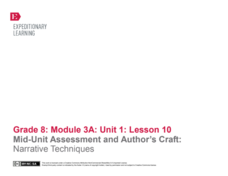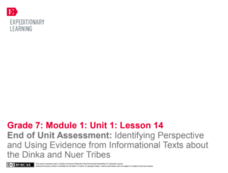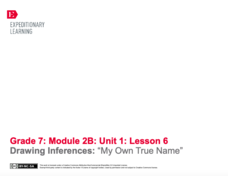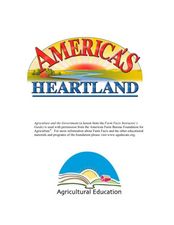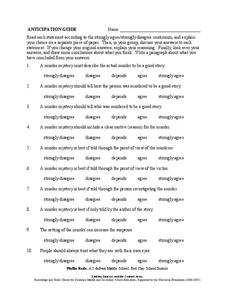PBS
Exploring Parent-Child Relationships Through Letter Writing
The PBS film, Bronx Princess, launches a study of complex parent-child relationships. Using the provided reading guide, viewers respond to clips from the film and compare Rocky and Yaa’s relationship to other parent-child relationships....
EngageNY
Grade 9 ELA Module 3, Unit 1, Lesson 3
To what extent can the surrounding environment influence one's behavior? Temple Grandin explores her connection to animals and her unique ability to understand their behavior with a lesson plan focusing on her book, Animals in...
EngageNY
Grade 10 ELA Module 4, Unit 2, Lesson 20
Using the resource, scholars work in small groups to rehearse a selected scene from Shakespeare's Macbeth. Finally, they present their interpretive dramatic readings to a group of peers or the whole class and complete a self-assessment...
EngageNY
Taking a Stand: Equal Rights for Women
Equality for all? Scholars talk with partners to predict Shirley Chisholm's stand in her speech "Equal Rights for Women." They then read the speech and circle unfamiliar words to understand the meaning better. Readers go on to answer...
EngageNY
Mid-Unit Assessment and Author’s Craft: Narrative Techniques
Scholars work together to compile a list of things good writers do to perfect their craft and write the ideas on a whiteboard. They then discuss the differences between passive and active sentences and use their knowledge to identify...
EngageNY
End of Unit Assessment: Identifying Perspective and Using Evidence from Informational Texts about the Dinka and Nuer Tribes
Pupils consider the varying perspectives of people in different cultural groups as they read an informational text about the Dinka tribe of Southern Sudan and complete graphic organizers. They also respond to a constructed-response...
EngageNY
Drawing Inferences: “My Own True Name”sl.7.1
How much are you worth? Scholars read text dependent questions, and discuss how the text relates to self worth. They then work with partners by having written conversation to make inferences about the text. For homework, pupils correct...
EngageNY
Poetic Tools in Narrative of the Life of Frederick Douglass
Scholars listen to a reading and answer probing questions about If We Must Die by Claude McKay. Readers annotate their personal copies of the poem as they discuss its figurative language, vocabulary, and meaning. They then transfer their...
EngageNY
Finding Relevant Information and Asking Research Questions: The Benefits of Video Games
Video games may not be so bad after all. As scholars read the text "The Many Benefits, for Kids, of Playing Video Games," they summarize the gist in their researchers' notebooks. Next, pupils draft supporting research questions based on...
EngageNY
Tracing the Idea of Fish Depletion: Chapter 1
Would you, could you? Scholars read World without Fish and focus carefully on the use of the words could and would. They chunk the text into smaller sections and write annotations on sticky notes to help with comprehension. To finish,...
EngageNY
Introducing World without Fish
One fish, two fish, red fish, no fish. Scholars analyze World without Fish to determine the gist, identify vocabulary, and answer text-dependent questions. As learners read, they use sticky notes to annotate the text. They also work in...
US House of Representatives
Keeping the Faith: African Americans Return to Congress, 1929–1970
The third lesson in a unit that traces the history of African Americans serving in the US Congress examines the period from 1929 through 1970. After reading a contextual essay that details the few African Americans elected to Congress...
US House of Representatives
Permanent Interests: The Expansion, Organization, and Rising Influence of African Americans in Congress, 1971–2007
The fourth installment of the seven-instructional activity unit focused on African Americans elected to and serving in the US Congress looks at the period from 1971 through 2007. Class members read a contextual essay that provides...
Historical Thinking Matters
Spanish-American War: 5 Day Lesson
Nine historical documents, an interactive online notebook, and a fantastic opportunity for historical inquiry await your pupils in this 5-day lesson plan. Class members identify and discuss various causes for the Spanish-American War...
National Endowment for the Humanities
Poems that Tell a Story: Narrative and Persona in the Poetry of Robert Frost
Dig in deeper with Robert Frost's, "Stopping by Woods on a Snowy Evening." Learners will read and discuss poems by Robert Frost and learn the meaning of terms such as narrative and personal. They journal, collaborate, and present poetry...
Digital Public Library of America
Teaching Guide: Exploring Little Women
Louisa May Alcott's Little Women is a literary masterpiece as well as a timestamp of the formative mid-nineteenth century in America. Using a primary source set of photographs, letters, and portraits, readers discuss the ways...
Curated OER
Using a Title to Determine the Main Idea
Use the title of a book to determine the main idea. Readers will view the cover of The Wedding and predict what the story will be about. Graphic organizers help chart important information and build new vocabulary. Other stories are used...
National Endowment for the Humanities
Arabic Poetry: Guzzle a Ghazal!
Learners research the evolution and cultural significance of the Arabic ghazal form of poetry. They, in groups, compose an original ghazal poem and read it aloud to the class.
Curated OER
Agriculture and the Government
Students study the government's involvement in the U.S. A's food production and make connections relating to farm programs. In this historical agriculture lesson, students read content and research significant information. Students then...
Curated OER
Running Out Of Time: Bloom’s Taxonomy Mixed with QAR
Dig into chapter 19 of Running Out of Time with questions covering each level of Bloom's Taxonomy. Learners read the text, respond to the questions in paragraph form, and then discuss the answers as a class.
Curated OER
Anticipation Guide
Young readers consider ten questions regarding murder mystery stories. The must choose from one of five options: strongly disagree, disagree, depends, agree, or strongly agree. A sample questions is, "A murder mystery must describe the...
Curated OER
Sexual Abuse: Sequoia's Story Discussion Guide
The subject matter of this lesson is intended for a mature academic audience. Please review to determine if it is suitable for your class. Students create a working definition of sexual abuse, read a scenario, and then break up into...
Curated OER
Charlotte's Web
Fourth graders focus on fluency by reading the book Charlotte's Web. In this reading strategies lesson plan, 4th graders partner read, do guided reading, and independent reading to increase fluency. Students use Venn Diagrams, discuss...
Curated OER
Winning the Vote for Women
Students read and respond to the text, Mama Went to Jail for the Vote. In this literary response instructional activity, students are introduced to vocabulary terms and read the book. Students discuss various text-to-self connections...
Other popular searches
- Guided Reading
- Guided Reading Comprehension
- Flat Stanley Guided Reading
- Guided Reading Lesson Plans
- Guided Reading Strategies
- Guided Reading Lessons
- Guided Reading Activities
- Guided Reading Fluency
- Dinosaur Guided Reading
- Guided Reading Elementary
- Guided Reading Lessons Plans
- Active Reading Guide






